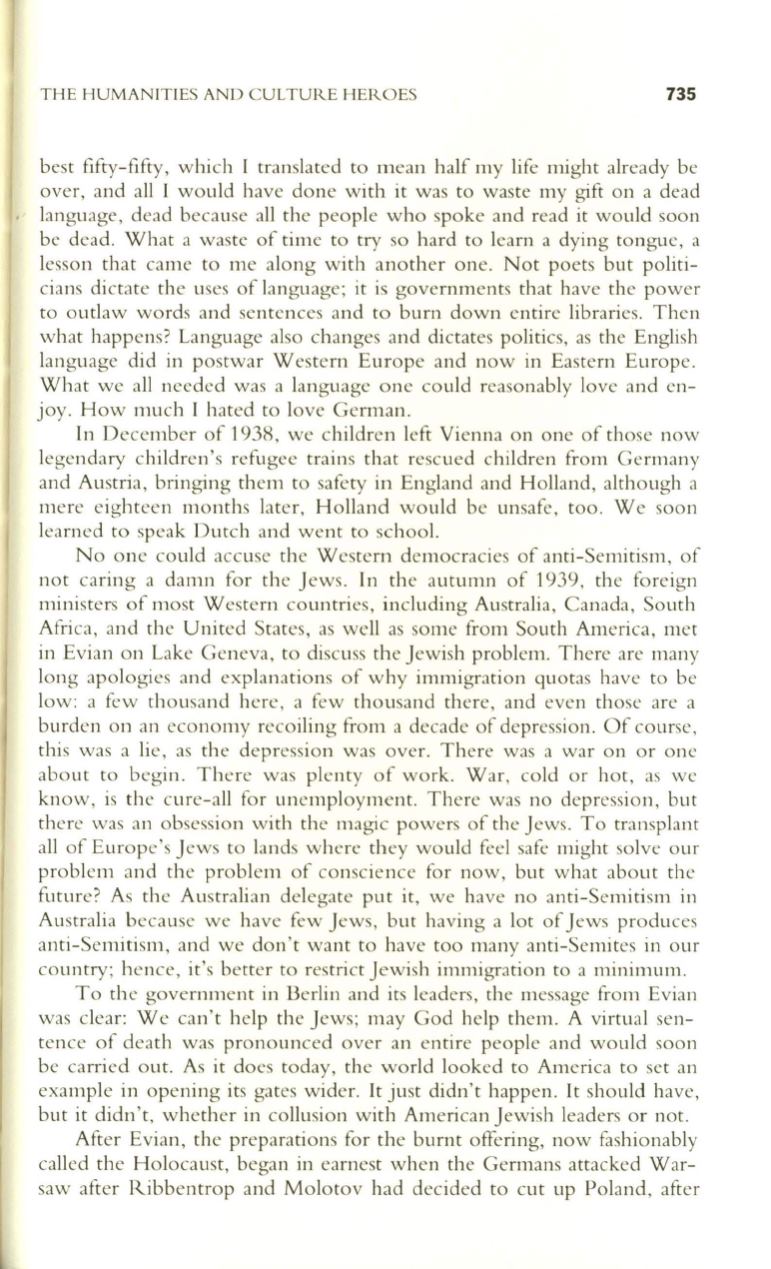
THE HUMANITIES AND CULTUR£ HEROES
735
best fifty-fifty, which I translated to mean half my life might already be
over, and all I wou ld have done with it was to waste my gift on a dead
language, dead because all the people who spoke and read it would soon
be dead. What a waste of time to try so hard to learn a dying tongue, a
lesson that came to me along with another one. Not poets but politi–
cians dictate the uses of language; it is governments that have the power
to outlaw words and sentences and to burn down entire libraries. Then
what happens? Language also changes and dictates politics, as the English
language did in postwar Western Europe and now in Eastern Europe.
What we all needed was a language one could reasonably love and en–
joy. How much I hated to love German.
In December of 1938, we children left Vienna on one of those now
legendary children's refugee trains that rescued children from Germany
and Austria, bringing them to safety in England and Holland, although a
mere eighteen months later, Holland would be unsafe, too. We soon
learned to speak Dutch and went to school.
No one could accuse the Western democracies of anti-Semitism, of
not caring a damn for the Jews. In the autumn of 1939, the foreign
ministers of most Western countries, including Australia, Canada, South
Africa, and the United State, as well as some from South America, met
in Evian on Lake Geneva, to discuss the Jewish problem. There are many
long apologies and explanations of why immigration quotas have to be
low: a few thousand here, a few thousand there, and even those are a
burden on an economy recoiling from a decade of depression. Of course,
this was a lie, as the depression was over. There was a war on or one
about to begin. There was plenty of work. War, cold or hot, as we
know, is the cure-all for unemployment. There was no depression, but
there was an obsession with the magic powers of the Jews. To transplant
all of Europe's Jews to lands where they would feel safe might solve our
problem and the problem of conscience for now, but what about the
future? As the Australian delegate put it, we have no anti-Semitism in
Australia because we have few Jews, but having a lot of Jews produces
anti-Semitism, and we don't want to have too many anti-Semites in our
country; hence, it's better to restrict Jewish immigration to a minimum.
To the government in Berlin and its leaders, the message from Evian
was clear: We can't help the Jews; may God help them. A virtual sen–
tence of death was pronounced over an entire people and would soon
be carried out. As it does today, the world looked to America to set an
example in opening its gates wider. It just didn't happen. It should have,
but it didn't, whether in collusion with American Jewish leaders or not.
After Evian, the preparations for the burnt offering, now fashionably
called the Holocaust, began in earnest when the Germans attacked War–
saw after Ribbentrop and Molotov had decided to cut up Poland, after


